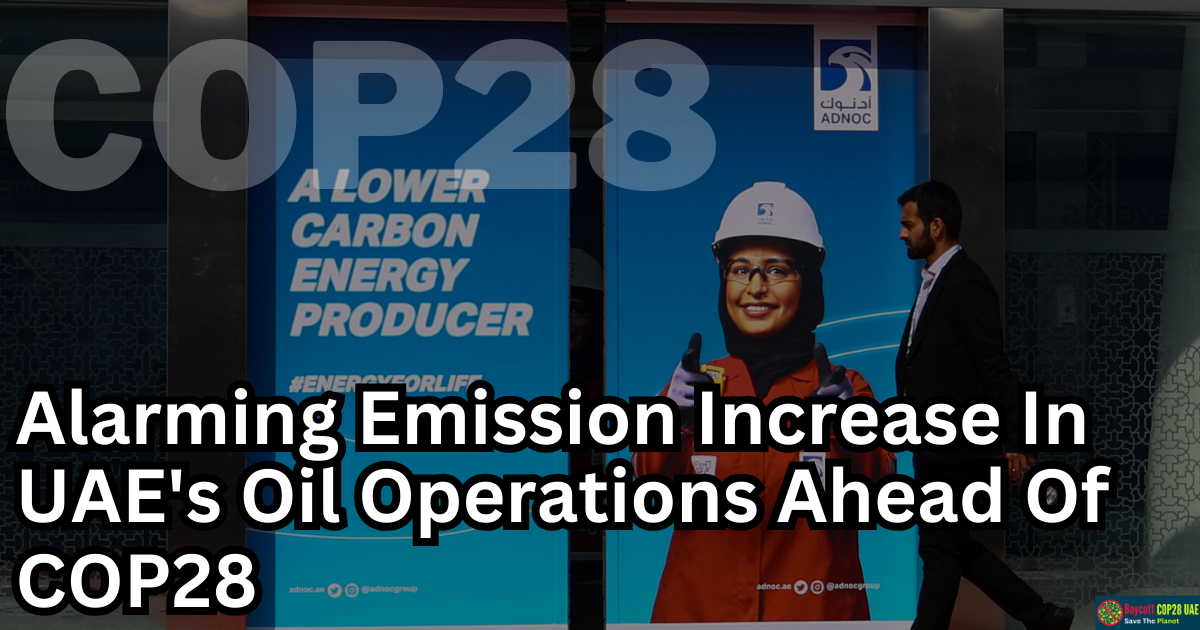In a surprising turn of events just months before the eagerly anticipated COP28, Sultan Al-Jaber, who serves as the chief organizer of the UN climate summit set to take place in Dubai this November, is facing scrutiny over his role as the head of Abu Dhabi National Oil Company (ADNOC). New analysis indicates that ADNOC is poised to significantly increase its carbon emissions, directly contradicting the global call to cap global warming at 1.5 degrees Celsius.
Recent revelations suggest that ADNOC, under Al-Jaber’s leadership, plans to elevate its emissions from oil and gas operations by more than 40 per cent by 2030, compared to levels in 2023. This stark contrast to the recommendations put forth by the United Nations and the world’s leading climate scientists raises concerns about the company’s alignment with COP28’s objectives.
According to data meticulously analyzed by Global Witness, ADNOC-operated fields are anticipated to yield over 1.3 billion barrels of oil and nearly 90 billion cubic meters of natural gas in 2030 alone, as indicated by industry statistics provided by Rystad Energy. When these energy resources are eventually consumed or processed by industries, we calculate that the resultant carbon dioxide emissions will amount to a staggering 684 million tonnes.
The carbon emissions associated with ADNOC’s oil and gas production will likely reach up to 487 million tonnes of CO2 by the end of this year. This trajectory implies that ADNOC’s carbon footprint is poised to swell by 40.5 per cent by the year 2030, in stark contrast to the United Nations’ call for emissions to plummet by 43 per cent over the same timeframe to keep the Paris
Agreement’s temperature goal of 1.5 degrees Celsius within reach.
Ironically, in response to the UN’s Global Stocktake measuring nations’ progress in addressing climate change, Al-Jaber vocally called for “ambition and urgency to reduce emissions by 43 per cent by 2030” just last month. At the commencement of an energy conference held in Abu Dhabi this week, he emphatically declared that achieving a 43 per cent cut in emissions over the next seven years simply respects science.
Notably, Al-Jaber has consistently underscored the importance of the 1.5 degrees Celsius goal for COP28, the highly-anticipated UN climate summit scheduled to begin in Dubai in November. The apparent contradiction between ADNOC’s emissions trajectory and Al-Jaber’s climate aspirations adds a layer of complexity to the upcoming summit’s agenda.
Adding to the controversy, ADNOC recently expedited its plans to drastically boost fossil fuel production capacity, aiming to reach an output of 5 million barrels of oil equivalent daily by 2027. This expansion appears at odds with the global push for reduced reliance on fossil fuels to combat climate change.
Critics argue that such a significant expansion of fossil fuel production is inconsistent with the urgent need to transition to renewable energy sources and reduce carbon emissions. Al-Jaber’s dual role as the head of ADNOC and the COP28 chief organizer is now under heightened scrutiny as the international community seeks clarity on the UAE’s commitment to climate action.
In response to mounting concerns, environmental advocates and climate activists are calling for greater transparency and concrete measures to align ADNOC’s operations with the global climate goals endorsed by the United Nations. Many argue that, given his prominent role in organizing COP28 and his public commitment to reducing emissions, Al-Jaber should lead by example by taking decisive action to rein in ADNOC’s emissions and steer the company towards a more sustainable future.
Al-Jaber and ADNOC’s challenge is emblematic of the broader global struggle to reconcile the imperative of reducing greenhouse gas emissions with the continued exploitation of fossil fuel reserves. As the world watches closely in anticipation of COP28, the actions and commitments of influential figures like Sultan Al-Jaber will undoubtedly shape the narrative surrounding climate action and the prospects for a sustainable future.






